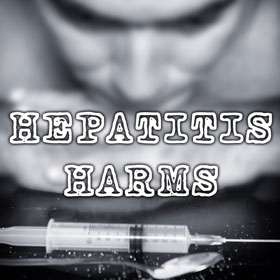Raising the Bar on Harm Reduction

It’s a tough thing to read about, but it’s an even harder way to live.
Addiction and drug use are complex issues. With them comes a range of behaviors, and the people who use drugs are – like all of us - complex, multi-faceted and much more than just their behavior.
Monday, May 19th, was National Hepatitis Testing Day. Now in just its third year, it was established to raise greater awareness of an epidemic that is too often unrecognized.
Hepatitis is an infectious disease of the liver. The most serious of which is Hepatitis C, and it is spread in large part by blood-to-blood contact with intravenous drug users. There’s no vaccine for it, but there is medication. It can be cured over 80 percent of the time with new treatments coming out now, but it’s still the leading cause of liver cirrhosis and cancer and, ultimately, liver transplants.
There are inherent risks associated with drug use – whether it’s where drugs are used, how they are used, and what kind or quality of drugs are being ingested, it’s clear some ways of using drugs are clearly safer than others.
That’s where the concept of harm reduction comes in. Harm reduction is practical strategies and practices aimed to reduce the negative consequences with drug use. That’s reduce, not eliminate, and that’s a very important distinction because the truth is sometimes the mission of public health can’t be to prevent people from doing the things that hurt them. Sometimes the best you can do for someone is help minimize the damage their actions cause.
Harm reduction does not attempt to minimize or ignore the harm and danger associated with drug use; instead, provides people with safer, more practical choices, such as limiting their intake or reducing the incidents of risky behavior. It often substitutes one behavior for another.
For example, we know sharing needles leads to spreading hepatitis C among intravenous drug users, so public health offices provide a place for users to throw away their used needles and replace them with clean ones which, in turn, reduces the risk of more disease spreading.
“The public health message is more than ‘Don’t use drugs.’”, said New Mexico Department of Health Southwest Public Health Region Director Ray Stewart. “It also stresses ‘If you use drugs, protect yourself and others around you.’”
The Southwest region of the New Mexico Department of health is made up of Dona Ana, Otero, Sierra, Socorro, Luna, Grant, Hildago and Catron counties, and over the years it has offered a comprehensive, integrated list of health services for people who use drugs to lessen the dangerous consequences of substance use/misuse/abuse, including:
- Syringe disposal and exchange.
- Narcan opiate overdose prevention training and dispensing.
- HIV counseling and testing
- Hepatitis C counseling, testing and medical evaluation/management.
The Las Cruces Public Health Office also offers several options for treatment with its Southwest Pathways including screening for substance abuse, opiate replacement/substitution therapy with buprenorphine for those using and SMART Recovery meetings.
This year, the Southwest Public Health Region office chose to do something special to recognize National Hepatitis Testing Day and Hepatitis Awareness Month in a way it hopes will be both longer lasting and have a greater impact for the community by announcing the formation of the Southwest Harm Reduction Coalition.
This coalition will serve as a forum for providers, consumers, and the public to discuss, plan, coordinate and evaluate ways to improve access to care and treatment for people with opiate dependency or addiction, particularly for persons also having Hepatitis C or HIV.
Coalitions like this already exist in some cities around the country. Like many of them, the Southwest Harm Reduction Coalition’s goal is to promote the health and dignity of individuals and communities impacted by drug use and improve the existing harm reduction policies and services not just within the Department of Health but for other organizations working on the same issues of drug use and infectious diseases like HCV and HIV.
The Southwest Harm Reduction Coalition meets every fourth Wednesday of the month. The next Southwest Harm Reduction Coalition meeting is scheduled for Wednesday, May 28 @ 11:30 AM - 1:30 PM at the Las Cruces Public Health Office at 1170 N. Solano Drive (at the corner of Solano and Spruce).
For more information, contact Travis Leyva at 575-528-5031.
Media Contact
We would be happy to provide additional information about this press release. Simply contact David Morgan at 575-528-5197 (Office) or 575-649-0754 (Mobile) with your questions.

